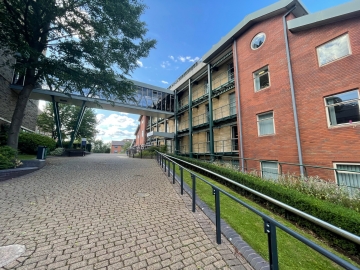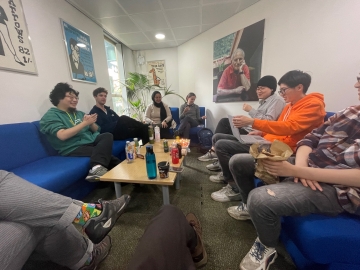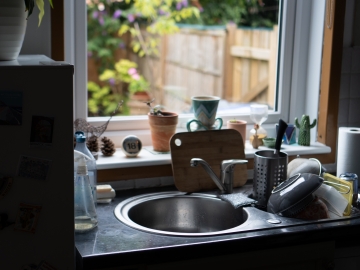Nagi Nakamura | 2nd year master’s student, School of Fundamental Science and Engineering
- Visiting Period: July 2023 to October 2023
- Study Abroad University: The University of Sheffield
- Country/Region: Sheffield, United Kingdom
Below is a study abroad experience report from Nagi Nakamura (2nd year master’s student, School of Fundamental Science and Engineering), who was able to go to Sheffield, UK, to study at The University of Sheffield. This study abroad experience was possible due to support from Waseda University’s Top Global University project “Waseda Goes Global”, referred to as TGU below.
My reasons for applying
I wanted to study abroad to experience firsthand diverse value systems and English skills which are difficult to learn in Japan, and conversely, to review my environment and life in Japan from an outsider’s perspective. I had wanted to study abroad at some point since I first entered university, because of my experience as a short-term exchange student in high school. However, I had always been hesitant to do so due to the compulsory subjects, COVID-19, job hunting, etc. The turning point for me was an international conference I attended in the winter of the first year of my master’s program. I was surprised at the diversity of viewpoints, values, and lifestyles of people from other laboratories in Japan and abroad, and I became aware of my own bias and lack of English proficiency and self-management skills. Considering what reminded of my student life, this was my last chance to learn, so I applied for the program. They are my primary reasons for applying to learn tolerance, English proficiency, and self-management skills. In addition, contrary to these obvious reasons, I have another less apparent reason. I have always thought that it is not good to blindly think of foreign countries as “great”, which may be common in Japan. The less apparent reason is that, by leaving Japan, I wanted to be able to think objectively about what is attractive about the circumstances in Japan and how I can proactively take advantage of these strength.
My research at the lab I visited
I worked with Dr. Shuhei Miyashita in the Department of Automatic Control and Systems Engineering at the University of Sheffield. In Japan, I have been working on origami electronic devices and during my time abroad, as a field related to my research, I worked on a transformable origami robot, in particular its basic deformation mechanisms. One folding form is used in the relevant research, but I aimed to create a robot that can unfold once from form A and re-fold to form B. For example, in the future, an origami robot may be used to remove foreign objects that have been accidentally swallowed inside the body, and it may transition from a compressed form to a gripper form. The main result of this research is the invention of hinges that self-deploy and self-fold driven by external stimuli, which is necessary for the transition process. Specifically, once a sheet is folded, it deploys itself by water and then folds itself again by heat. We produced several samples of crease patterns using the hinges. We are summarizing this study and currently writing a paper to submit for publishing in an academic journal.
The university environment
The strict and detailed rules were one of the differences from Japan. The lab’s hours are strictly set from 8:30 AM to 6:00 PM on weekdays, and only local Ph.D. students are permitted to have the keys, so I had to ask other students to open and close the lab. I also had to follow very strict safety management rules and conduct thorough risk assessments. I heard that the rules are stricter in the U.K., and at first, I was surprised by the gap between Japan and the U.K. However, I wanted to be able to manage my research well, so it was a good opportunity for me. In the UK, the number of years required for university is different from that in Japan, and many of the students around me had 3 years of undergraduate studies, 1 year of master’s studies, and 4 years of Ph.D. studies. The number of Ph.D. students is larger than in Japan, and undergraduate and master’s students only need to visit the laboratory for half a year at a time. While I was there, 1/3 of the students were master’s students and 2/3 of them were Ph.D. students. Compared to Japan, I think that the management of the laboratory was student-based. I felt the strength of teamwork because, although professors gave advice, it was especially obvious that students helped each other. Somewhere someone was discussing everything from research to administrative problems all day long.
- The Kroto Institute
- Lab members
International exchange
I was fortunate to have a large number of students to interact with compared to other areas because the professors were married and shared the running of the lab room. Students of various nationalities, such as British, French, Italian, Egyptian, Chinese, Cypriot, and so on, belonged to the group. A common topic of conversation every time we ate lunch together was our own cultures. There were many students from China, and in the years when the university’s ranking was high, I heard that half of the faculty was from China. I also have fond memories of cheering for the local soccer team and going out for dinner and a movie after the lab was closed. I was able to connect with friends of friends at these times and could interact with many students outside of the lab. By chance, I also joined a group that played mahjong on holidays. In addition, I became friends with a postdoc fellow who had obtained his Ph.D. in Japan. Wherever I went, people talked to each other casually, and as a result, discussions were lively. I would like to emulate this quality.
- Lunchtime
- Local soccer game
The accommodations
Due to the tight schedule from the decision to the departure I arrived during high season and was unable to secure consecutive accommodations, so I moved twice after that. Each place was within 20-30 minutes’ walking distance from the lab, and I lived in the southern area of downtown Sheffield. The first was a house with a 70-year-old woman host. The second was a shared house with four tenants, and the third was a house with a 40-year-old male host and his dog and two tenants. All of the houses had a little garden in the front, a house in the middle, and a back garden similar to the front one. This is a typical house configuration in the UK. There are many old-fashioned houses with rows of houses connected side by side, and all of the accommodations I stayed in were in this style. While Japan and the rest of the world were hit by a heat wave, the temperature in England was a cool 20 ℃ or so, but my friend said, “It’s a heat wave this year.” Indeed, even though it was cool, there were days when the temperature reached 25-26 ℃, and on such days, it was common to feel hot because the brick houses were like ovens, accumulating heat. (Most houses are not equipped with air conditioners or fans.)
- Roadside
- The kitchen in the accomodation
The surrounding area
Sheffield is a medium-sized city in the middle of England. There are many tourist attractions such as Manchester and the Peak District National Park to the west, and York to the north. It used to be famous for the iron industry, but now it is a student town with two universities. There were enough stores for food, clothing, and home supplies that I never had to worry. As is common all over England, there are more independent stores than in Japan. On the other hand, there are fewer large shopping facilities like Bic Camera, Don Quijote, or Tokyu Hands in Japan. So, it is difficult to find specific goods which you want to buy. As a result, I had to use online shopping sites a lot. In the UK, there are rarely re-delivery services and package-dropping services, so deliverers leave your goods with your neighbors. This would be unacceptable in Japan, but since everyone lives in houses connected side-by-side, the relationship with neighbors is also different from that in Japan. You can also use the delivery lockers (although they are usually full). As for transportation, it is different from London and Tokyo, so basically the commuting area is within the city, and most people live within walking distance or bus distance. In the case of Sheffield, there are so many student apartments in the city, that I think the majority of students live within a 5-minute walk from the university. The train was something to be used when going out. In Sheffield, the east and northeast areas are better, and the houses are bigger and fancy. On the other hand, the atmosphere changes suddenly in the north, south, and away from the center of the city. I lived in the south, so I tried to avoid going out at night. One of the things that impressed me during my stay was there were more differences in security and income inequality than I had expected before I went there.
I have forgotten to mention that there are many old stone buildings all over the city that are worth seeing. At a local home improvement center, there is a large selection of materials for reforming the inside of stone houses, such as doors, windows, bathtubs, etc. I felt the difference in cultures that continue to use old buildings.
- Lunch at the church
- National railway museum, York
- The peak district
- York minster
Differences from Japan
As I had expected, the food culture was certainly very different. Meal deals (like bentos or lunchboxes) and eating out are relatively expensive. On the other hand, there is a wide variety of vegetables and other ingredients that are inexpensive compared with the broader cost of living. So, the other international students prepared their food at home. From what I experienced watching my hosts, most English home dishes require only “combining, frying, or boiling,” without time-consuming preparation, giving me the impression that the foods were “uninteresting.” The ingredients themselves were tasty. Restaurants were also delicious (although, expensive).
In addition to the usual things such as rainy weather, fewer disasters, and access to Europe, one of the most impressive things to me was the cheerfulness of the people. My host, who loves Japan, shared their opinion that the English people are selfish, but Japanese people are kind and polite, which is wonderful. In my opinion it seems people in England can communicate willingly in a number of where Japanese, such as talking to others when they seem to be in trouble or making small talk with people they have never met before at the cash register, in the elevator, on the train, etc. I think this is a respectful characteristic.
Troubles abroad
There were a few problems during my stay, and I would like to share them for your reference. The first one is about laundry. I arrived in the middle of July, and it rained almost every day for a month or less. Before arriving in Japan, I thought that because it rained so much, the washing machines would naturally have a drying function, but this was not the case, and none of the three apartments I stayed at had the function. I was told that student apartments are equipped with a washing machine, but in the case of traditional buildings, it is common for the washing machine to fit in a small space under the kitchen. So, you should be aware of that.
Second, there was a problem on my return flight. I was scheduled to fly home from Manchester to Dubai, but just before I left home on the last day, I received an e-mail that the first flight was delayed by 2 hours. However, it was just a notice, and there was no information on how to fix the problem or make up for it, nor any contact information, so I was quite worried. Since there was no way to get anywhere, I decided to go to Dubai anyway, but by the time I arrived at the gate, the delay had worsened, and a second transfer was done since it was no longer possible to make the connection. Since the second flight was a full day later, I had to make a hotel reservation. After arriving in Dubai, I had no more problems, but I unexpectedly had to spend a whole day there, and since my suitcase was not returned, I could not prepare a change of clothes, etc., which was a little inconvenient. Fortunately, I had all the chargers in my carry-on luggage, so I was able to escape that problem, but in the future, I will prepare enough luggage in my carry-on luggage to be able to spend one day on my return flight in anticipation of such a situation. I recommend you take measures to prepare for such a situation, including keeping a change of clothes and necessary items (chargers, etc.) in your carry-on luggage.
My next goal
My goal was to experience life in a foreign country firsthand and to gain an objective perspective of Japan. I am sure that nobody can be perfect, but I believe that I was able to achieve both of these goals to a satisfactory level. As a university with many international students, I was able to interact with people with different values and cultures from my own, not only from England but also from many other countries, and I thought a lot about the differences between Japan and other countries.
The first thing that I felt is necessary is that I should be able to explain “Japan” to others from my point of view. I need to be able to think about whether or not, I can achieve my life’s priorities in Japan in the future, considering the international situation and economy, national policies, demographic structure, competitiveness, etc. Also, I have to be able to explain this to others clearly and I should think about it with a level head.
My second new goal is to be able to more smoothly communicate in English. Honestly, my first and second priorities for this stay were self-management and research, and English was my third priority. However, as a result, I felt that not stumbling in English was essential for learning the above two things over a longer period. Although this trip is over, I would rather put more effort into my studies in the future. In a sense, I think I was able to reaffirm the breadth of the world and the depth of my learning. It was such a good experience that inspired me to actively look forward to being posted overseas and pursuing a Ph.D. while working. If there are people who have wanted to study abroad but have not been able to do so, I would like to tell them that it is not too late to do so, even if they are in the second year of their master’s.


















